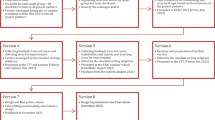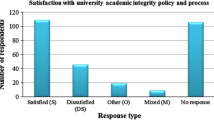Abstract
Education in the responsible conduct of research (RCR) in the United States has evolved over the past decade from targeting trainees to including educational efforts aimed at faculty and staff. In addition RCR education has become more focused as federal agencies have moved to recommend specific content and to mandate education in certain areas. RCR education has therefore become a research-compliance issue necessitating the development of policies and the commitment of resources to develop or expand systems for educating faculty and staff and for assuring compliance. These changes implied the need to develop a program evaluation model that could be applied to institutional RCR education programs, which were expected to differ from traditional academic credit-bearing courses targeting trainees. Information gleaned from the examination of corporate compliance models was analyzed in order to create a program evaluation module that could be used to document and assess educational programs focused on teaching RCR. A programmed series of questions for each of the nine RCR content areas identified by the United States Office of Research Integrity was created based on a performance-monitoring evaluation model. The questions focus on educational goals, resources provided to support the educational efforts, educational content, content delivery, educational outcomes, compliance requirements and feedback. Answers collected in response to the questions could be used to both document and continually improve the quality of RCR educational programs through on-going formative assessment and feedback.

Similar content being viewed by others
References
Bebeau, M. J. (1993). Designing an outcome-based ethics curriculum for professional education: Strategies and evidence. Journal of Moral Education, 22(3), 313–325.
Bebeau, M. J. (1994). The impact of a dental ethics curriculum on moral reasoning. Journal of Dental Education, 58(9), 684–692.
Brown, S., & Kalichman, M. W. (1998). Effects of training in the responsible conduct of research: A survey of graduate students in experimental sciences. Science and Engineering Ethics, 4(4), 487–498.
Crawford, D. B., Chaffin, C. G., & Scarborough, S. (2001). Effective compliance systems: A practical guide for educational institutions. Altamonte Springs: The Institute of Internal Auditors Research Foundation.
Ferrell, O. C., LeClair, D. T., & Ferrell, L. (1998). The federal sentencing guidelines for organizations: A framework for ethical compliance. Journal of Business Ethics, 17, 353–363.
Grant, G., Guyton, O., & Forrester, R. (1999). Creating effective research compliance programs in academic institutions. Academic Medicine, 74(9), 951–971.
Mastroianni, A. C., & Kahn, J. P. (1998). The importance of expanding current training in the responsible conduct of research. Academic Medicine, 73(4), 1249–1254.
Newcomer, K. E., Hatry, H. P., & Wholey, J. S. (2004). Meeting the need for practical evaluation approaches: An introduction. In J. S. Wholey, H. P. Hatry, & K. E. Newcomer (Eds.), Handbook of practical program evaluation (p. xxxiv). San Francisco: Jossey-Bass.
Poister, T. H. (2004). Performance monitoring. In J. S. Wholey, H. P. Hatry, & K. E. Newcomer (Eds.), Handbook of practical program evaluation (pp. 98–125). San Francisco: Jossey-Bass.
Sachs, G. A., & Siegler, M. (1993). Teaching scientific integrity and the responsible conduct of research. Academic Medicine, 68(12), 871–875.
Steneck, N. H. (2004). ORI introduction to the responsible conduct of research. Rockville: Office of Research Integrity.
U.S. Department of Health and Human Services. (1989). Responsibility of PHS awardee and applicant institutions for dealing with and reporting possible misconduct in science. Title 42. Code of Federal Regulations. Part 50. Subpart A. Retrieved January 20, 2010 from http://ori.dhhs.gov/misconduct/reg_subpart_a.shtml.
U.S. Department of Health and Human Services. (1995). Responsibility of applicants for promoting objectivity in research for which PHS funding is sought. Title 42. Code of Federal Regulations. Part 50. Subpart F. Retrieved February 8, 2010 from http://grants.nih.gov/grants/compliance/42_CFR_50_Subpart_F.htm.
U.S. Department of Health and Human Services. (2005). Public health service policy on research misconduct. Title 42. Code of Federal Regulations. Parts 50 and 93. Retrieved February 8, 2010 from http://ori.dhhs.gov/documents/42_cfr_parts_50_and_93_2005.pdf.
U.S. Department of Health and Human Services. (2009). Protection of human subjects. Title 45. Code of Federal Regulations. Part 46. Retrieved February 8, 2010 from http://www.hhs.gov/ohrp/humansubjects/guidance/45CFR46.htm.
U.S. National Institutes of Health. (1989). Requirement for programs on the responsible conduct of research in National Research Service Award Institutional Training Programs. NIH Guide to Grants and Contracts, 18(45), 1.
U.S. National Institutes of Health. (1993). NIH Revitalization Act of 1993. Plan for use of animals in research. Retrieved November 16, 2009 from http://grants.nih.gov/grants/olaw/pl103-43.pdf.
U.S. National Institutes of Health. (2000). Required education in the protection of human research participants. Notice: OD-00-039. Retrieved September 22, 2009 from http://grants.nih.gov/grants/guide/notice-files/NOT-OD-00-039.html.
U.S. Office of Inspector General. Department of Health, Human Services. (2003). Solicitation of Information and recommendations for developing compliance program guidance for recipients of NIH research grants. Federal Register, 68(172), 52783.
U.S. Public Health Service. (2000). PHS policy on instruction in the responsible conduct of research (RCR)-suspended. Retrieved November 17, 2009 from http://ori.dhhs.gov/policies/RCR_Policy.shtml.
U.S. Public Law 99-158. (1985). Health Research Extension Act of 1985 November 20, 1985. Animals in research. Retrieved November 16, 2009 from http://grants.nih.gov/grants/olaw/references/hrea1985.htm.
U.S. Sentencing Commission Guidelines Manual. (2007). Sentencing of organizations. Chapter 8. B2.1. Effective compliance and ethics program. Retrieved November 12, 2009 from http://www.ussc.gov/2007guid/CHAP8.html.
Walsh, B. E., Moran, J. W., McDougall, G. J. (2000a). The compliance umbrella. NACUBO Business Officer, January 2000, 18–42.
Walsh, B. E., Moran, J. W., McDougall, G. J. (2000b). Operating process. NACUBO Business Officer, March 2000, 43–48.
Wholey, J. S. (2004). Evaluability assessment. In J. S. Wholey, H. P. Hatry, & K. E. Newcomer (Eds.), Handbook of practical program evaluation (pp. 33–62). San Francisco: Jossey-Bass.
Worthen, B. R., Sanders, J. R., & Fitzpatrick, J. L. (1997). Program evaluation. Alternative approaches and practical guidelines (pp. 30–33). White Plains: Longman Publishers.
Acknowledgments
Funded in part by an RCR Resource Development contract from The Office of Research Integrity. I thank Mr. Edy Sulistyo for developing a web-based prototype of this evaluation instrument. Please contact Lynne Olson at olson.3@osu.edu for a copy of the prototype.
Author information
Authors and Affiliations
Corresponding author
Appendices
Appendix A
Questions Developed for Each Element of the Proposed Model for Evaluating RCR Education Programs
Input | |
|---|---|
No. | Question |
1 | Are there resources devoted to support the University RCR education effort? |
2 | Is money allocated for staff salary? |
3 | Are the personnel who are devoted to the education effort provided with the opportunity to engage in continuing education related to RCR in the area of <-%area%->?a |
4 | Describe briefly the level of experience expected for personnel devoted to the RCR education effort in the area of <-%area%->? |
5 | How many non-faculty (i.e. administrative or support staff positions) are devoted to the University RCR education effort in the area of <-%area%->? |
Enter information for each position - click to add a text field if there is more than one position devoted to the education effort. | |
6 | What budgetary resources support the University RCR education effort? |
Process | |
|---|---|
No. | Question |
1 | Is education in the content area of <-%area%-> required at your institution? |
2 | Is education/training offered? |
3 | Under what authority is education/training in the content area of <-%area%-> required? |
4 | How frequently is this education/training required? |
5 | How are education/training opportunities related to <-%area%-> announced and/or promoted? |
6 | Are there consequences for failure to comply with this education requirement? |
7 | Who is responsible for delivering the education/training in the content area of <-%area%->? |
8 | How is the education/training in the content area of <-%area%-> delivered? |
9 | How frequently is education/training in the content area of <-%area%-> offered? |
10 | Are records kept noting the number of individuals who complete the education/training in the content area of <-%area%->? |
11 | Are records kept noting the names of individuals who complete the education/training in the content area of <-%area%->? |
12 | Is learning assessed; i.e is there a way for participants to check their knowledge level in the content area of <-%area%->? |
13 | What levels of education/training are offered in the content area of <-%area%->? |
14 | Who creates the content for this section? |
15 | Who reviews the content for this section for accuracy, completeness, etc.? |
16 | Who approves the content for this section? |
17 | Who updates the content for this section? |
18 | How frequently is the content reviewed and updated? |
19 | For which <-%subarea%-> is education in the content area of <-%area%-> required at your institution |
Output | |
|---|---|
No. | Question |
1 | Have you established any measures for the effectiveness of your RCR program in the area of <-%area%->? |
2 | Have you established any measures for the efficiency of your RCR program in the area of <-%area%->? |
3 | How many people at your institution have received education/training in RCR during the past year in the area of <-%area%->? |
4 | Has your RCR program in the area of <-%area%-> won any honors or awards? |
5 | Has your RCR program in the area of <-%area%-> generated any educational materials? |
6 | Is there a non-electronic resource room or library or other central location where individuals can access educational or other reference materials related to RCR in the area of <-%area%->? |
7 | Is there an institutional website where individuals can access educational on other electronic reference materials related to RCR in the area of <-%area%->? |
Feedback | |
|---|---|
No. | Question |
1 | Is feedback collected from persons attending the educational sessions? |
2 | Is feedback collected from persons providing the educational sessions? |
3 | Is feedback collected from administrative personnel associated with the educational session? |
4 | Is feedback collected from administrative staff regarding the adequacy of resources to support the RCR program in the area of <-%area%->? |
Goal | |
|---|---|
No. | Question |
1 | The main goal of the RCR education program in the area of <-%area%->is: |
Table of authority | |
|---|---|
No. | Question |
1 | Which university office is ultimately responsible for assuring the responsible conduct of research in this content area? For example, which institutional office is named on assurance documents, if applicable? (eg. President, Vice President for Research, College Dean) |
2 | Who is the responsible official for ultimately assuring the responsible conduct of research in this content area; i.e. who holds the office named in Question #1? |
3 | Which university office(s) is/are responsible for assuring education in the responsible conduct of research in this content area? Examples include, Director of Research Integrity, Associate Vice President for Research Compliance |
4 | Who is/are the official(s) responsible for assuring education in the responsible conduct of research in this content area; i.e. who holds the office named in Question #3? |
5 | Which office(s) provide resources for supporting education in the responsible conduct of research in this area? |
6 | What federal, state, and/or institutional policies apply to education in the responsible conduct of research in this area? |
Appendix B
See Table 2.
Rights and permissions
About this article
Cite this article
Olson, L.E. Developing a Framework for Assessing Responsible Conduct of Research Education Programs. Sci Eng Ethics 16, 185–200 (2010). https://doi.org/10.1007/s11948-010-9196-4
Received:
Accepted:
Published:
Issue Date:
DOI: https://doi.org/10.1007/s11948-010-9196-4




